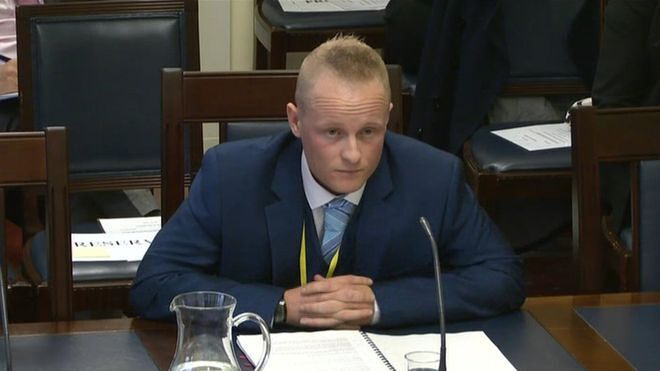By Tony O’Reilly-
There has been an observable shift in the perspective of loyalist communities in Northern Ireland regarding the Irish Sea trading border has been noted, with many young people considering “non-political solutions,” according to testimony before the Northern Ireland Affairs Committee.
Jamie Bryson, a prominent loyalist activist and Director of Northern Ireland Policy at the Centre for the Union, expressed his apprehension about the interruption in the transition of paramilitary groups toward civilianization in light of ongoing concerns about post-Brexit trading arrangements.
In his testimony, Bryson revealed that paramilitary leaders had informed him about the increasing interest among young loyalists to join the struggle against the Irish Sea border, with many of them expressing anger and seeking alternatives to traditional political channels.
The Northern Ireland Affairs Committee is currently investigating the impact of paramilitary activity and organized crime on Northern Irish society.
Powersharing in Northern Ireland has been suspended for over 18 months due to a protest by the Democratic Unionist Party (DUP) against the internal UK trade barriers created by the Northern Ireland Protocol.
The DUP has refused to return to devolution until the UK government addresses its concerns by way of legislation regarding Northern Ireland’s place in the UK internal market.
Discussions between the DUP and the government have been ongoing throughout the summer, with one aspect of the framework for reforming the protocol, the green/red lane system for the movement of goods, recently becoming operational at Northern Ireland ports.
Jamie Bryson emphasized that there needs to be a conducive political environment for loyalist paramilitary organizations to transition toward civilianization and that the political context as it stands is impeding this process.
He noted that the organizations’ leaders must be able to assure their members that “The Union is safe,” but the presence of the protocol and framework hinders that assurance.
When asked about his worst fear concerning how these concerns might manifest in Northern Ireland, Mr. Bryson expressed his worry about the hardening of opinions within loyalist communities.
While emphasizing the need for peaceful and lawful protests, he acknowledged significant anger within working-class loyalist communities and warned that without a solution, progress could regress, potentially leading to a new generation of young loyalists considering non-political solutions.
DUP committee member Carla Lockhart inquired about the impact of the Irish Sea border on recruitment for loyalist paramilitary groups and its effect on transition. Mr. Bryson confirmed that it had made recruitment more attractive for young lads, but the organizations had discouraged violence, opting for peaceful protests and political action instead.

